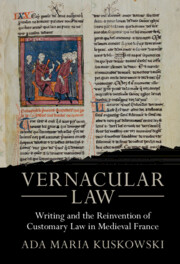Book contents
- Vernacular Law
- Studies In Legal History
- Vernacular Law
- Copyright page
- Dedication
- Contents
- Figures
- Acknowledgments
- A Note on the Text
- Introduction Vernacular Writing and the Transformation of Customary Law in Medieval France
- Part I Written Custom and the Formation of Vernacular Law
- Part II Political and Intellectual Tensions
- 4 Uneasy Jurisdictions: Lay and Ecclesiastical Law
- 5 Roman Law, Authority, and Creative Citation
- Part III Implications
- Conclusion Lasting Model and Professional Community
- Bibliography
- Index
4 - Uneasy Jurisdictions: Lay and Ecclesiastical Law
from Part II - Political and Intellectual Tensions
Published online by Cambridge University Press: 27 October 2022
- Vernacular Law
- Studies In Legal History
- Vernacular Law
- Copyright page
- Dedication
- Contents
- Figures
- Acknowledgments
- A Note on the Text
- Introduction Vernacular Writing and the Transformation of Customary Law in Medieval France
- Part I Written Custom and the Formation of Vernacular Law
- Part II Political and Intellectual Tensions
- 4 Uneasy Jurisdictions: Lay and Ecclesiastical Law
- 5 Roman Law, Authority, and Creative Citation
- Part III Implications
- Conclusion Lasting Model and Professional Community
- Bibliography
- Index
Summary
The fourth chapter discusses the question of why now – why did customary law become the subject of vigorous written output at this particular thirteenth-century moment? The answer lies in the politics of customary law or, more specifically, the changes in both society and legal culture that created new zones of competition between secular and ecclesiastical courts. Competition between the temporal and spiritual jurisdictions was, of course, not new. The investiture controversy that began in the eleventh century, based in the conflict over the right of appointment of church officials, showed this to be a key issue of the high medieval period. The nature of competition manifested in the coutumiers was a little different. The coutumiers aimed to theorize, regularize, and professionalize the secular courts in the face of ecclesiastical courts, which had already gone through the same process and offered a competing forum at a time when boundaries were still being defined.
Keywords
- Type
- Chapter
- Information
- Vernacular LawWriting and the Reinvention of Customary Law in Medieval France, pp. 155 - 188Publisher: Cambridge University PressPrint publication year: 2022

